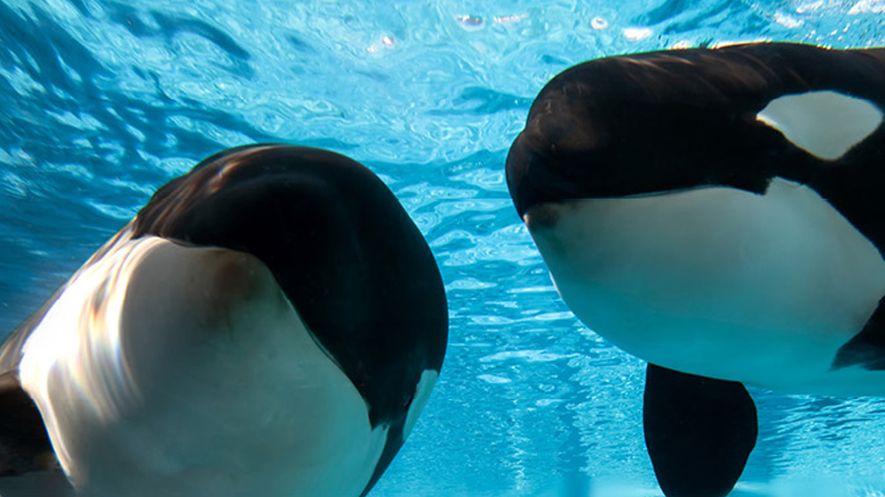After negotiations with The Humane Society of the United States (HSUS), SeaWorld has announced it will end the breeding of killer whales at its facilities and will have no orcas at all in any new parks opened around the world.
SeaWorld is also taking a number of other positive steps to address the welfare of other animals, including rescue and rehabilitation, and the sourcing of food served to more than 20 million people annually.
SeaWorld also announced that it would phase out its theatrical orca shows in favor of orca exhibits that highlight the whales’ natural behaviors, and have no orcas at all in any new parks around the world. This means that the remaining orcas will be the last generation housed at SeaWorld. The company has also agreed to redouble its efforts to conduct rescue and rehabilitation for a wide variety of marine creatures in distress; join The HSUS in its advocacy campaigns against commercial whaling, sealing, shark finning, and other cruelties; and revamp food policies at all of its parks for 20 million visitors.
SeaWorld pledged to invest at least $50 million over the next five years for the rescue and rehabilitation of marine animals and on advocacy campaigns, including The HSUS.
“These two organizations have been long-time adversaries, but we’re excited now to see the company transforming its operations for the better on animal welfare,” said Wayne Pacelle, president and CEO of The HSUS. “Today’s announcement signals that the era of captive display of orcas will end and that SeaWorld will redouble its work around rescue and rehabilitation of marine mammals in crisis and partner with us to tackle global threats to marine creatures.”
The HSUS has long been critical of keeping orcas and dolphins in captivity, and has clashed with SeaWorld for more than two decades. Of SeaWorld’s orcas, 23 were born in captivity. SeaWorld ended live capture of orcas and other marine mammals from the wild years ago, and reaffirmed that commitment today.
“SeaWorld takes seriously its responsibility to preserve marine wildlife. As one of the largest rescue organizations in the world, we will increase our focus on rescue operations— so that the thousands of stranded marine mammals like dolphins and sea lions that cannot be released back to the wild will have a place to go,” said Joel Manby, president and CEO of SeaWorld.
“Together with HSUS, and with our 20 million guests and 20,000 employees we can build an army of advocates to protect animals and wild places.”
SeaWorld has weathered strong currents of public criticism since the release of the 2013 documentary “Blackfish,” and today’s announcement comes in the wake of increasing pressure and calls on the company to end captive orca performance at its parks.
“This is a first, massive step forward toward a more humane future for SeaWorld,” said Dr. Naomi Rose, marine mammal scientist at the Animal Welfare Institute and formerly with The HSUS. “I welcome these commitments from Joel Manby. He has given SeaWorld a new lease on life.”
“This is a defining moment. The fact that SeaWorld is doing away with orca breeding marks truly meaningful change,” said Gabriela Cowperthwaite, director of “Blackfish.”
Through collaboration or confrontation, or sometimes a combination of the two, The HSUS has worked in recent years to secure substantial animal welfare commitments from companies working within food and agriculture, cosmetics and chemical manufacturing, fashion, the pet industry, animals in entertainment, and other sectors. In addition to its new policies for orcas, SeaWorld has committed to:
Maximizing its focus on rescue and rehabilitation of marine animals in distress and highlighting the plight of unreleasable animals to foster a stronger bond between humans and animals and to educate people about ongoing threats to them.
Participating in advocacy campaigns to end the commercial slaughter of marine mammals. Specifically, SeaWorld plans to advocate for an end to commercial whaling and sealing and to fight shark finning throughout the world. We expect the company will weigh in on a range of other issues that adversely affect the lives of marine creatures.
Revamping its food policies by changing its procurement practices to source only sustainably raised seafood, crate-free pork and cage-free eggs, and to offer more vegan and vegetarian options at all of its restaurants and other food service operations, which serve more than 20 million people annually. Protecting coral reefs and reducing the commercial collection of wild-caught ornamental fish.
For more information, click here.





